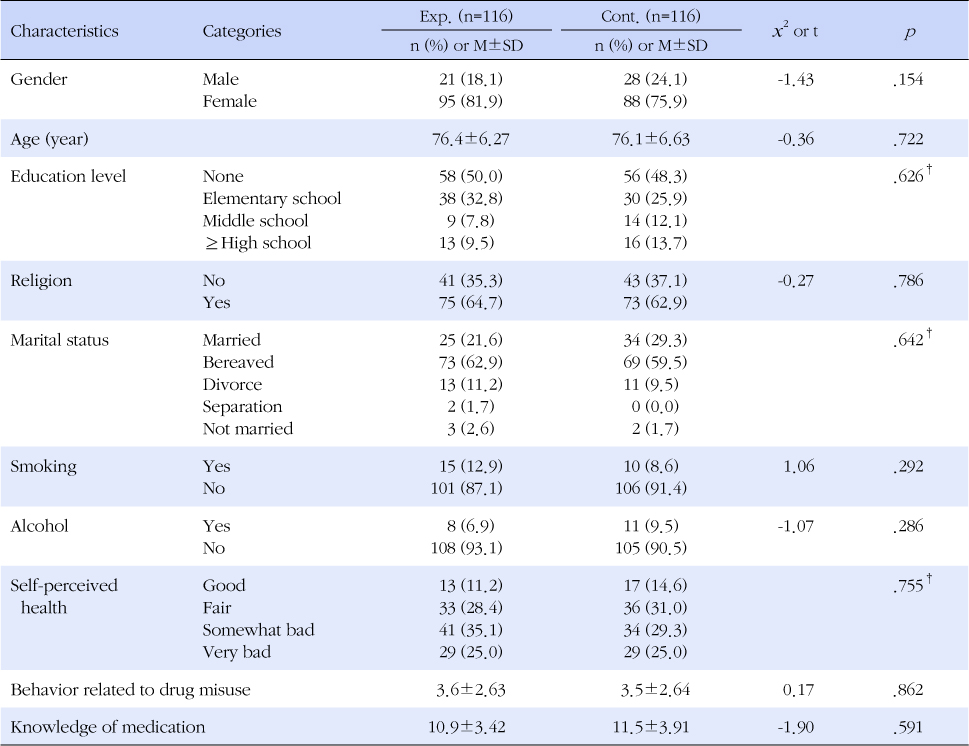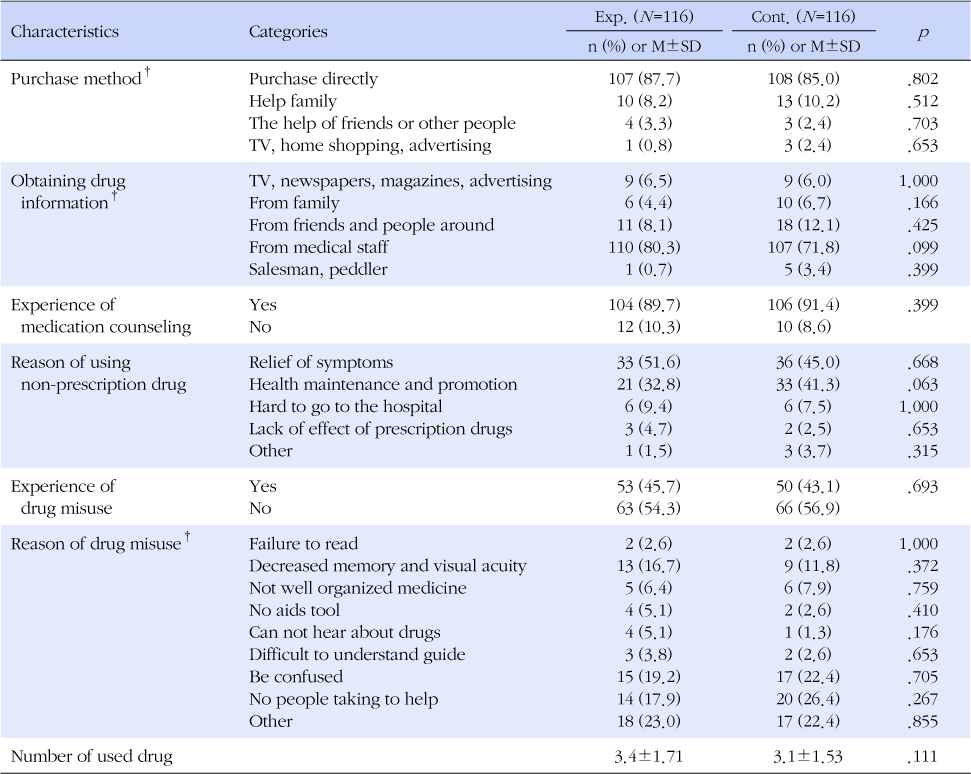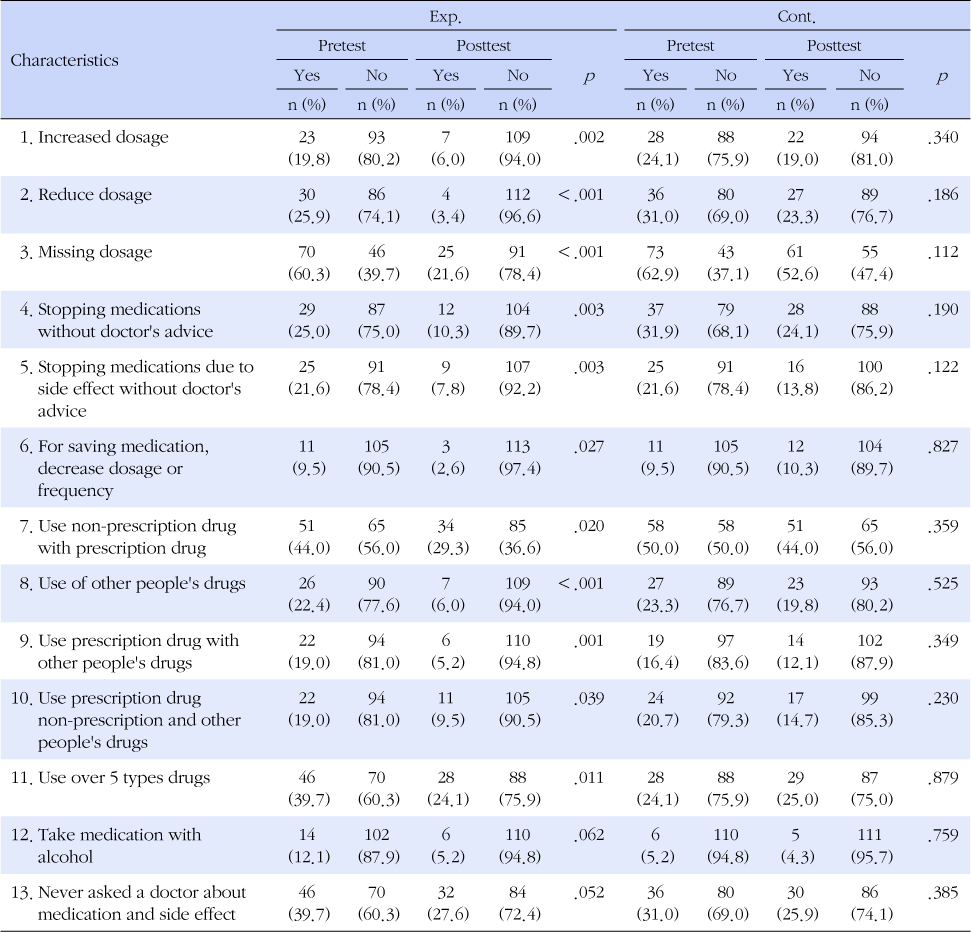Articles
- Page Path
- HOME > J Korean Acad Community Health Nurs > Volume 25(3); 2014 > Article
-
Original Article
- Medication Status and the Effects of a Medication Management Education Program for the Elderly in a Community
- Young-Im Park, Kang-Yi Lee, Dong-Oak Kim, Dong Choon Uhm, Ji-Hyun Kim
-
Journal of Korean Academy of Community Health Nursing 2014;25(3):170-179.
DOI: https://doi.org/10.12799/jkachn.2014.25.3.170
Published online: September 30, 2014
1Department of Nursing, Daejeon University, Daejeon, Korea.
2Department of Emergency Medical Technology, Daejeon University, Daejeon, Korea.
• Received: November 7, 2013 • Revised: August 30, 2014 • Accepted: September 5, 2014
© 2014 Korean Academy of Community Health Nursing
This is an Open Access article distributed under the terms of the Creative Commons Attribution Non-Commercial License (http://creativecommons.org/licenses/by-nc/3.0/) which permits unrestricted non-commercial use, distribution, and reproduction in any medium, provided the original work is properly cited.
- 734 Views
- 10 Download
- 5 Crossref
Abstract
-
Purpose
- This study investigated medication status by examining the effects of a medication management education program on the knowledge of medications and medication misuse behaviors in the elderly in a local community.
-
Methods
- This study used a non-equivalent control group quasi-experimental design. For the study, 116 subjects were assigned to the control group and another 116 subjects were assigned to the experimental group. The medication management education program consisted of 1:1 education, practice in medication management, consultation, and discussion. Data were analyzed using the SPSS 21.0 program.
-
Results
- Statistically significant differences were found between the experimental and control groups in terms of their knowledge of medications and medication misuse behaviors.
-
Conclusion
- The results indicate that the medical management education program is effective in improving the knowledge of medications and decreasing medication misuse behaviors. Therefore, this education program can be used as an intervention to improve the medication behaviors of the elderly in local communities.
Table 3Changes in Drug Misuse Scores before and after Application of the Medication Management Education Program (N=232)


-
This study was supported by Daejeon Metropolitan Government and Ministry of Health and Welfare Research Grant of Korea in 2012.
NOTES
- 1. Ministry of Health and Welfare. 2011 Survey on the elderly status - A nationwide survey on the elderly living status and welfare needs [Internet] Seoul: Ministry of Health & Welfare, Korea Institute for Health and Social Affairs; 2012;cited 2012 July 16. Available from: http://www.mw.go.kr/front_new/jb/sjb030301vw.jsp?PAR_MENU_ID=03&MENU_ID=030501&page=2
- 2. Hajjar ER, Cafiero AC, Hanlon JT. Polypharmacy in elderly patients. Am J Geriatr Pharmacother. 2007;5(4):345–351. http://dx.doi.org/10.1016/j.amjopharm.2007.12.002ArticlePubMed
- 3. Beckman A, Parker MG, Thorsund M. Can eldery people take their medicine? Patient Educ Couns. 2005;59:186–191. PubMed
- 4. Jang IS. A study on the status of drug use in elders in Kyongbuk province. J Korean Gerontol Nurs. 2007;9(1):40–50.
- 5. Lee JK. Factors associated with drug misuse behaviors among polypharmacy elderly. Korean J Adult Nurs. 2011;23(6):554–563.
- 6. Kim SO, Park JY, Choi YS, Lee HY, Ki JH. Control scheme of drug cost according to a sort of medical service using. Seoul: National Health Insuranc. J Korean Acad Soc Nurs Educ. 2008;14(2):376–389.
- 7. Hong KL. How do you approach the consultation of medication? J Korean Soc Health Syst Pharm. 2004;21(2):30–67.
- 8. Kerzman H, Baron-Epel O, Toren O. What do discharged patients know about their medication? Patient Educ Couns. 2005;56(3):276–282. ArticlePubMed
- 9. Kim KH, Park SH, Lee HK. A study on the factors influencing to the medication compliance of the hypertensive patient in one public health center in Seoul. Korean J Health Promot Dis Prev. 2005;5(4):267–274.
- 10. Hope CJ, Wu J, Tu W, Young J, Murray MD. Association of medication adherence, knowledge, and skills with emergency department visits by adults 50 years or older with congestive heart failure. Am J Health Syst Pharm. 2004;61(19):2043–2049. ArticlePubMed
- 11. Kim YH, Lee MK, Lee SJ, Cho MS, Hwang MS. Medication status and adherence of the elderly under home care nursing. J Korean Acad Community Health Nurs. 2011;22(3):290–301. Article
- 12. Park M. Drug use in the elderly. J Korean Acad Fundam Nurs. 2008;15(2):195–205.
- 13. Shin KR, Kim JS, Kim JY, Yi HR. Effects of a drug misuse and abuse prevention program on knowledge, attitude, and preventive behaviors related to drug misuse and abuse, and depression in low-income elderly women. J Korean Acad Nurs. 2005;35(5):763–773. ArticlePubMedPDF
- 14. Lee JH, Park MH. The effects of an education program for safe drug use in the rural elderly. J Korean Acad Nurs. 2007;37(3):295–304. ArticlePubMedPDF
- 15. Lee DY. Development and evaluation of preventive education program for medication misuse of the community dwelling elderly [master's thesis]. Seoul: Yonsei University; 2002. 123 p.
- 16. Kim YJ. The effects of an education program on the knowledge of medication and prevention of depression in the elderly with chronic disease at a local community. J Korean Acad Community Health Nurs. 2011;22(4):399–408. Article
- 17. Ellor JR, Kurz DJ. Misuse and abuse of prescription and nonprescription drugs by the elderly. Nurs Clin North Am. 1982;17(2):319–330. ArticlePubMed
- 18. Park BY. General pattern of drug use in the elder [master's thesis]. Seoul: Chungang University; 2003. 35 p.
- 19. Han KS, Moon SY, Park HO, Park EH. The survey on the drug use status, knowledge and attitude of college students (Seoul and northern part of the Kyunggi-do). J Korean Acad Soc Nurs Educ. 2000;6(2):376–389.
- 20. Hong YS. A study on medications information, usage and misusage on ambulatory elderly patients of a public hospital [master's thesis]. Seoul: Hanyang University; 2009. 69 p.
- 21. Bergman-Evans B. AIDES to improving medication adherence in older adults. Geriatr Nurs. 2006;27(3):174–182. ArticlePubMed
- 22. Kim MS, Lee JE. Comparing the elderly patients' drug misuse and abuse behavior between ordinary patients and low-income elderly patients. Korean Rev Crisis Emerg Manage. 2011;3(2):18–39.
- 23. Lee JK. Evaluation of a medication self-management education program for elders with hypertension living in the community. J Korean Acad Nurs. 2013;43(2):267–275. http://dx.doi.org/10.4040/jkan.2013.43.2.267ArticlePubMed
- 24. Bernsten C, Bjorkman I, Caramona M, Crealey G, Frokjaer B, Grundberger E, et al. Improving the well-being of elderly patients via community pharmacy-based provision of pharmaceutical care: A multicentre study in seven european countries. Drugs Aging. 2011;18(1):63–77.
- 25. Grymonpre RE, Williamson DA, Montgomery PR. Impact of a pharmaceutical care model for non-institutionalised elderly: Results of a randomised controlled trial. Int J Pharm Pract. 2001;9(4):235–241. ArticlePDF
- 26. Modig S, Kristensson J, Ekwall AK, Hallberg IR, Midlov P. Frail elderly patients in primary care-their medication knowledge and beliefs about prescribed medicines. Eur J Clin Pharmacol. 2008;65(2):151–155. http://dx.doi.org/10.1007/s00228-008-0581-8ArticlePubMedPDF
Figure & Data
References
Citations
Citations to this article as recorded by 

- Development and effectiveness of an integrated medication management program centered on senior welfare centers for older adults with hypertension: A cross-sectional study
Heuijeong Moon, Dukyoo Jung
Journal of Korean Gerontological Nursing.2023; 25(3): 297. CrossRef - Relationships between health literacy, self-efficacy, and medication adherence in older people with polypharmacy: A cross-sectional study
Jee Young Cho, Sun Ju Chang
Journal of Korean Gerontological Nursing.2023; 25(4): 357. CrossRef - Development and Evaluation of an Antiviral Agent Medication Adherence Education Program for Patients with Chronic Hepatitis C
Hoo Jeung Cho, Euna Park
International Journal of Environmental Research and Public Health.2020; 17(18): 6518. CrossRef - Correlation of physical, psychological, and functional factors with independent medication adherence in Korean older adults with chronic illness: Using the 2017 national survey of older Koreans
Hae Ok Jeon
Archives of Gerontology and Geriatrics.2020; 90: 104130. CrossRef - Artificial Intelligence-based Medication Behavior Monitoring System using Smartwatch
Suyong Jeong, Hwiwon Lee, Sangpil Yoo, Kyungjun Lee, Sungphil Heo
The Journal of Korean Institute of Information Technology.2020; 18(8): 125. CrossRef

 KACHN
KACHN




 PubReader
PubReader Cite
Cite

